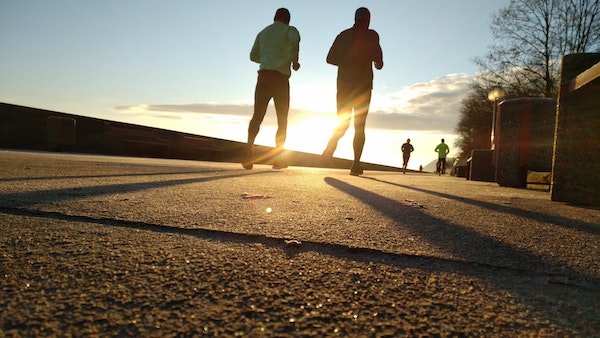
Running is one of the most popular ways to work up a sweat.
In fact, in 2018 over 64 million Americans ran at least once. It’s easy to see why so many people have hopped aboard the cardio train as it immediately comes with several advantages.
- No equipment necessary
- Can do it almost anywhere
- Plenty of fresh air
Whether you run around your neighborhood or get on a treadmill at the gym, there are plenty of places where you can get your blood pumping. But how do you know if running is right for you?
In this article, we’ll run down all the major running pros and cons to help you decide if this exercise is right for you.
Running is a great fitness option when you want to move at your own pace. A brisk jog around your neighborhood a few times a week to start can really work wonders — you’ll burn a lot of calories and drastically improve your conditioning.
However, running is a high-impact exercise that can frequently lead to injuries if you’re not careful, and it won’t do much in terms of developing your upper body.
But let’s take a closer look at why running might be a good fit for you, and why it might not be.
Pros of Running (Benefits)
If it’s been a while since you’ve worked out, then there is a lot of appeal to running.
You don’t have to worry about which weights are right for you. You also don’t have to think about which muscles to target and how.
Let’s dive headfirst into all of the perks of becoming a runner.
A Cheap Regimen
A gym membership can set you back $50 a month at some places.
Even at-home workout routines will often require equipment like bands, pull-up bars, dumbbells, or a yoga mat.
It can all add up quickly.
When you want to start running, all you need is a good pair of shoes and comfortable clothing. It’s a minimal investment for gear that will last you a long time.
There are also ways you can get creative with your runs if you don’t want to have the neighbors see you. See if your city has any of the following.
- Natural trails
- Bike paths
- National forests
Running can be a great way to get out of the city and check out the world around you.
It’s just important to bear in mind that you want to stay within your comfort level. If you’re going out on a nature trail, then you want to make sure it’s fairly flat if you’re just a beginner.
Hills, dips, and rivers can throw a wrench in your exercise plans if you’re not careful. Even experienced runners can trip and fall if they are not careful. As long as you’re aware of what’s around you, you’ll have little to fear.
A Real Calorie Burner
When you run, you’re using a bunch of different muscles at the same time. This makes it a great way to burn a lot of calories in a short amount of time compared with other exercises.
According to one study, a 180-pound person can burn 17 calories per minute even when going at a fairly brisk pace.
Your exact calorie burn rate will vary depending on a number of different factors, but you can expect to do a lot of good even with only an hour of running.
Plus, if you want to increase your calorie burn rate, you could incorporate some other exercises into your run.
After running one mile, you can drop and do 20 push-ups. That way you get the most out of every run.
Supercharge Your Conditioning (and plenty of other stuff!)
Running does a lot more than burn calories, however.
There are numerous other health benefits you stand to gain by running regularly, including:
- Strengthening muscles
- Building stronger bones
- Enhancing overall circulation
- Improving heart health
In addition to helping your heart and lungs, running is fantastic for your mind. Running, like other forms of exercise, releases endorphins to put you in a better mood.
(Ever heard of a runner’s high?)
Running helps reduce stress, improve memory, and combat cognitive decline.
But probably the biggest benefit is that running will dramatically improve your cardiovascular conditioning and stamina.
You’ll feel more energetic and get winded far less easily in your daily life.
It can be hard to get into running initially (before you build up your stamina). However, if you stick with it, you’ll find that the advantages will follow you for years to come.
Cons of Running (Disadvantages)

There is plenty to love about running.
But just like any other form of exercise, you need to consider the cons, too. It’s not necessarily that running is bad, it just may not be the right form of exercise for you.
Here are a couple of drawbacks to think about before pursuing running in earnest.
Potential for Injuries
This holds true for any kind of new exercise. If you do too much too quickly, then you will sustain injuries.
This can prevent you from exercising consistently at the beginning of your new journey, which can be extremely detrimental.
Runners are at a particular disadvantage because they can develop numerous injuries quickly from all the impact on their feet, knees, ankles, and other joints, such as:
- Shin splints
- Plantar fasciitis
- Stress fractures
- Achilles tendinitis
This is why it’s important to start slow. When you’re just starting out, you may want to only jog for one mile, making sure to go slow the entire time.
It’s also critical to make use of rest days. It can be exciting to start a new exercise regimen, but overexerting yourself will just cause more harm in the long run.
You also want to listen to your body. When your body hurts, you don’t want to continue running as this will only exacerbate the injury.
Take it slow. Take a breather when you need it. And make sure you have the right shoes before you start.
Initial Weight Gain
Another downside to watch out for is that you may actually gain weight when you first start running.
It can be disheartening to see. You make the effort to go out running, and now, the opposite of the results you want occur.
It’s very, very, very important to remember that initial weight gain is natural.
When you begin any new exercise regimen, your body will go through a lot of changes. Exercising puts stress on your muscle fibers, causing micro-tears.
Don’t worry. It’s less disastrous than it sounds.
When micro-tears occur, there is some inflammation. This causes your body to retain more water, and as a result, you’ve put on some extra weight. This will go away eventually, but that leads into the second form of extra weight.
As you run more and more, your body adds on new lean muscle mass, mostly in your legs. This will occur after the first month of consistent running. You may put on a little extra weight, but this is natural and actually healthy.
With greater muscle mass, you’ll have an easier time burning calories.
It can take some adjustment to get used to your new body, but rest assured, these changes are for the best in the long run.
(Find out more of what you can expect your first month of running here.)
Not Ideal for Upper Body Development or Overall Muscle Mass
Distance or speed running is an unreal conditioning workout.
And as you progress toward the advanced levels of the sport, you’ll find your legs looking toned and athletic (especially if you’ve used your running to achieve a leaner body fat percentage).
But running will do little to nothing for your upper body, and if it’s a toned, athletic physique you’re after, you’re going to need to supplement with weight training.
Even with perfect running discipline and nutrition, it’s unlikely you’ll get a ripped six-pack or juicy biceps without adding weights or calisthenics to your routine.
Wrapping Up
There are numerous running pros and cons to consider if you want to become a regular jogger.
Running is an excellent exercise if you want to lose weight because it burns so many calories and whips you into top condition, without even the need for a gym membership! You just need the commitment to get outside and run consistently.
However, beware of injuries due to overuse or bad form. And you might be a little disappointed in your physique (especially in the upper body) even at advanced levels of running if you’re not supplementing with other kinds of workouts.
You can always mix and match different forms of exercise to achieve whatever your fitness goals may be, you don’t have to just run!
Is there anything we missed? What do you love most about running if you’re already an avid jogger?
Hope this helps!
(Not sure if running is for you? Check out the pros and cons of getting started with yoga, calisthenics, and weightlifting.)